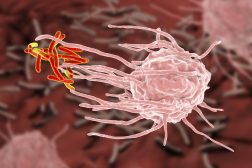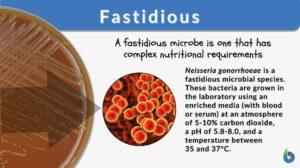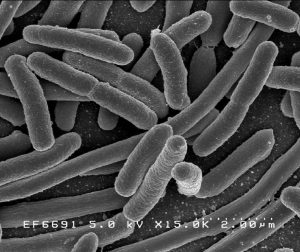Search Results for: bacterium
Hfr bacterium
Definition noun, plural: Hfr bacteria A bacterium that possesses the F factor integrated into the bacterial genome, hence,... Read More
F-positive bacterium
Definition noun, plural: F+ bacteria A bacterium with F factor existing as a plasmid and not integrated in the bacterial... Read More
F-prime bacterium
Definition noun, plural: F' bacteria The bacterium possessing a plasmid containing the F factor and a part of the bacterial... Read More
Nitrifying bacterium
Definition noun, plural: nitrifying bacteria A bacterium that is capable of converting ammonium into... Read More
Hfr strain
Definition noun A strain of bacterial that possesses the F factor integrated into the bacterial genome, hence, when it... Read More
Biological Cell Defense
Organisms must find a means of defense against antigens such a viruses described on the previous tutorial. If this was not... Read More
Cell morphology
The basic essence for any living organism is its structural framework which includes appearance, form, and the... Read More
Fastidious
Fastidious Definition We can define fastidious as a term used in microbiology to denote a species that lacks the ability to... Read More
Aerobic bacteria
Aerobic Bacteria Definition What does aerobic mean in biology? As the name suggests, 'aerobe' in biology means organisms... Read More
Endocytosis
Endocytosis Definition What is endocytosis in biology? Endocytosis is a cellular process by which a cell internalizes any... Read More
Obligate aerobe
Before we define obligate aerobes, let us first understand and define aerobic organisms. Aerobic organisms are those that... Read More
Mitochondrion
Mitochondrion Definition What are mitochondria? The term “mitochondrion” comes from the two words of the Greek... Read More
Heterotroph
Heterotroph Definition What is a heterotroph? Does a heterotroph make its own food? In biology and ecology, a heterotroph... Read More
Biosecurity and Biocontrol
By: Maria Victoria Gonzaga In the previous lesson, we learned about the importance of modern science... Read More
Bacillus megaterium
Definition noun An endospore forming rod-shaped bacterium recognized as an endophytes involved in the production of various... Read More
Reservoir host
Reservoir Host Definition A reservoir host is a host that harbors the pathogen and serves as a source of the infective... Read More
Clostridium tetani
Definition noun An obligate anaerobic rod shaped and gram-positive bacterium which appears to looks like a drumstick that is... Read More
Staphylococcus epidermidis
Definition Noun A gram-positive facultative bacterium that produced slime for adhesions associated with endocarditis and... Read More
Enterobacter aerogenes
Definition Noun A gram-negative rod shaped motile and encapsulated bacterium and have peritrichous flagella that surrounds... Read More
Neisseria sicca
Definition Noun A gram-negative diplococcus oxidase positive commensal bacterium involved as a normal flora of human oral... Read More
Neisseria flavescens
Definition Noun A gram-negative saprophytic bacterium found normally in the nasopharynx, mouth and upper respiratory tracts... Read More
Moraxella bovis
Definition Noun A gram-negative non-motile coccobacillus and highly opportunistic aerobic bacterium involved in Bovine... Read More
“Mutualism factor” could explain why body does not attack normal flora
When sadness reeks in and you feel as if you are all by yourself, think again. That is because you are never alone. As a... Read More
Humoral immunity
Let’s get to know where one should place humoral immunity, the topic of today’s discussion!! By the end of the article,... Read More
Decomposer
Decomposer Definition The organisms that carry out the process of decay or breakdown of the dead organism are known as... Read More
Susceptible
Resistance, vulnerability, sensitivity, tolerance, and susceptibility are some highly important terminologies across the... Read More
Abortive transduction
Abortive transduction Transduction in which the genetic fragment from the donor bacterium is not integrated in the genome of... Read More
Suppressor-sensitive mutant
suppressor-sensitive mutant A conditionally lethal, host range, bacteriophage mutant that produces nonsense codons and can... Read More
Lysogenic conversion
Lysogenic conversion --> lysogeny (Science: virology) The ability of some phages to survive in a bacterium as a result of... Read More
Biological Viruses
The prime directive of all organisms is to reproduce and survive and this also applies to viruses. Apparently, viruses are... Read More























